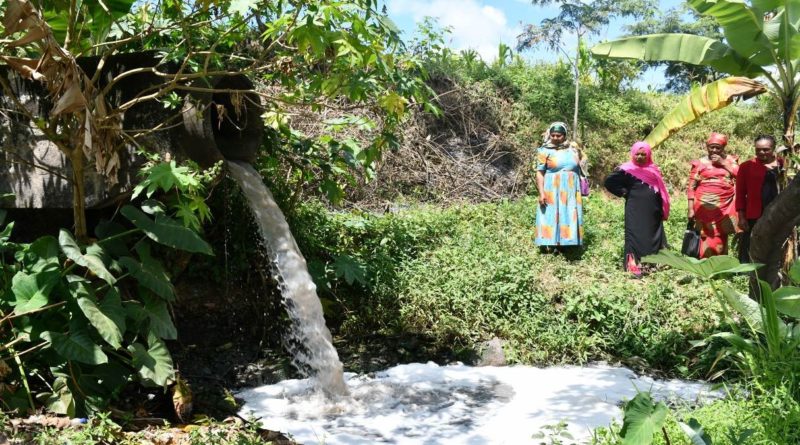Arena meeting participants visited a number of informal settlements in Arusha (Tanzania)
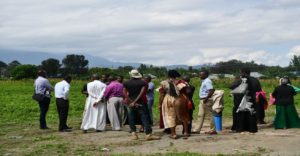
On May 30, 2018, the participants of the Transition Management process, multiple actors active in different organisations and sectors such as the government, NGOs and the University, visited different informal settlements in Arusha with the aim to learn about local challenges and opportunities (e.g. innovative projects and initiatives).
The visit started in Darajambili area where Mr. Osward Mpombo from Arusha Urban Water and Sanitation Authority (AUWSA) welcomed the participants in the area and explained how the sewage system is operating. He explained that one of the four sewage ponds stopped to work properly creating a malfunction of the overall system and contaminating the river. Participants actively asked many questions to Mr. Osward. In one of his answers, he explained that even though the water is contaminated and not drinkable, local residents are continuing to use it for washing and this could negatively affect residents’ health.
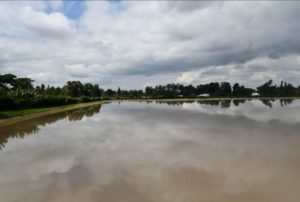
The participants had then the opportunity to visit one area where the Tanzania Federation for the Urban Poor (TFUP) is operating. The coordinator of TFUP in Arusha, Mama Mahija Rajab, also one of the active participants of the Transition Management process, welcomed the participants in the TFUP office. She started by explaining that TFUP is organized in saving groups composed of mainly women. TFUP is the national organisation of Slum Dwellers International (SDI), a global network aiming at reducing poverty in slum communities and empowering slum dwellers around the world.
In Arusha, TFUP carries out multiple activities, such as conducting the enumeration of the communities, setting up sanitation and water projects, constructing social houses and developing projects on health and education (e.g. for preventing HIV). Following the participants’ questions, Mama Mahija shared some of the main challenges faced by the organisation such as the economic challenges and the lack of collaboration with organisations supporting them as entrepreneurs. She continued by explaining how TFUP is organized. For example, multiple meetings are regularly organized at different levels, like at community and regional level and TFUP members use to meet periodically with a committee supervising their work and providing feedback.
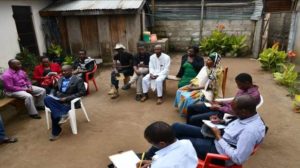
At lunch time the participants reached Lemalaat river. Waste water coming from multiple industries is directed into this river highly contaminating the water. Local residents are still continuing to use the water of the river especially for irrigating the surrounding agricultural areas as well as for washing and bathing. Mr. Osward Mpombo explained that the quality of water has never been analysed so its level of contamination is still unknown. What is certain is that the water pollution by multiple chemicals of Lemalaat river is very harmful to local ecosystems and dangerous for the health of the people living in the area.
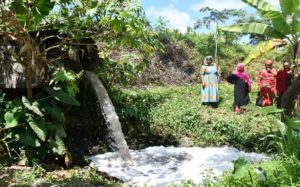
The visit continued in Unga Limited area. Participants learnt that in this area water taps owned by AUWSA are most of the time not working or not working properly. For this reason local residents depend on the water supplied by a borehole owned by the Mosque.
During the next visit at ‘Olevolosi’ water project, participants engaged in a discussion around the interactions between AUWSA, community water committees and international development organisations such as World Bank.
The participants also visited two other water projects in Ngaramtoni area. One of them is the ‘eWater’ project that is allowing local residents to supply water by using a smartcard that it is connected to mobile money services.
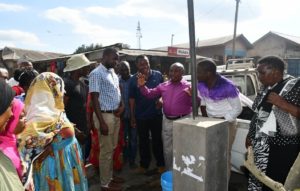
The following day the participants gathered again and discussed what they learnt from the visit to the different areas of the city. Some of the participants shared their worry about the water contamination in the different parts of the city, while other participants said that the water should be first analysed to be sure of their contamination. Different points of view on how to tackle these problems emerged during the discussion.
Diving into the reality of informal settlements represented a powerful learning opportunity for the Transition Management process’ participants. They could see with their eyes and understand at a deeper level what are the existing challenges and opportunities faced by local residents. This experience shows the importance for researchers and civil servants to use innovative ways to facilitate learning processes among stakeholders belonging to different sectors as well as to support the connection and trust building between institutional actors and community members.

